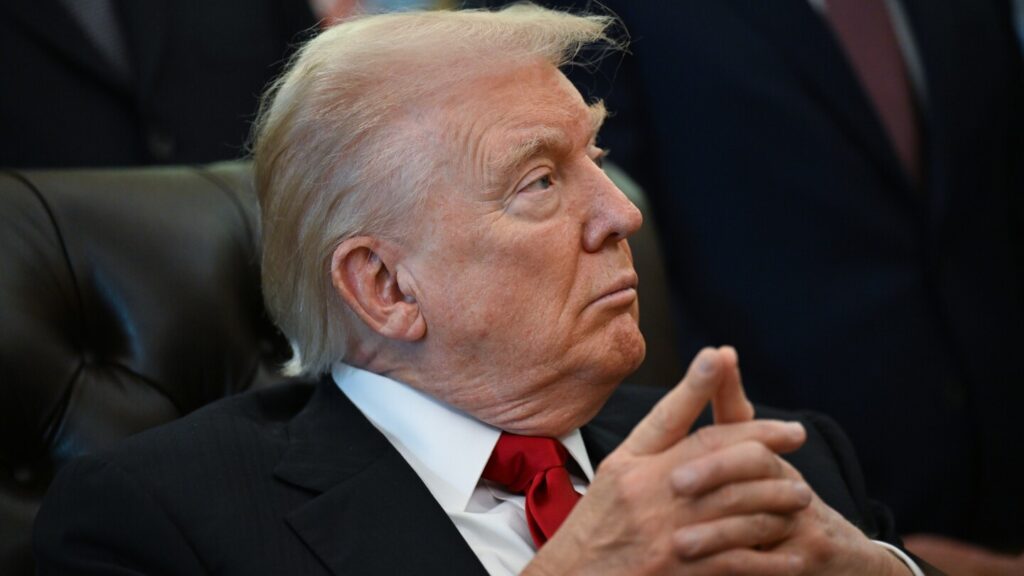Most would prefer to keep politics out of sports. That’s hard to do when sports is caught up in politics. (And when sports shows platform politicians.)
In the case of NIL payments for college athletes, the stewards of college sports have run to politics for relief from the mess the industry made for itself via decades of maintaining a rigged system that violated the antitrust laws and exploited the players.
One politician is fully on board with the idea that the only way to avert a supposed disaster is to artificially limit the amount of money college athletes can make.
Appearing Tuesday with Pat McAfee, President Trump pushed the idea that a free market for college football players will eventually spell doom.
“Well, it is a very serious problem because even football where they give quarterbacks $12 million, $13-14 million . . . all of a sudden you’re going to be out of control,” he said, via Mark Giannotto of USA Today. “And even rich colleges are going to go bust because you’re not going to be able to do this. And you know they had the old way, they gave scholarships, they did lots of good things, but there could be some form of payment. But when they start bidding up the costs, look the NFL and all teams, they have caps. You don’t really have that in college sports, and when the guard comes along that weighs 350 pounds and he’s phenomenal and they say that’s gonna make the difference between having a great team and a lousy team, and they give him $10 million, that’s going to start happening pretty soon. All of a sudden you’re going to have like NFL-type payrolls. . . .
“[C]ollege football is very big, but as big as it is, if they don’t do some very powerful caps, these colleges are all going to go out of business no matter how rich they are.”
But that’s how free markets operate, sir. That’s how it works for college coaches, who get millions to show up — and millions to leave.
Change one word in the first sentence uttered on the issue. Replace “quarterbacks” with “coaches.”
We’ll do it for you: “Well, it is a very serious problem because even football where they give coaches $12 million, $13-14 million . . . all of a sudden you’re going to be out of control.”
But they’re already paying coaches that much, and no one is saying it’s out of control or that it’s going to force colleges out of business.
It’s only an existential threat when the rabbit has the gun. It’s only a problem when the players have a chance to do what people like President Trump have done their whole lives, and continue to do every day. Capitalize on every available opportunity to make as much money as they can. (That’s what “capitalism” means, folks.)
Here’s a possible response to the President’s rant, within the confines of a true dialogue/debate on the topic. “Sir, has anyone ever tried to limit the amount of money you make? . . . Sir, is it not for all businesses to operate within their means? . . . Sir, don’t businesses that fail to operate within their means go bankrupt all the time?”
Why should player compensation be capped? The only apparent reason is that Trump and others (like his buddy Nick Saban and, given his silence on the issue, McAfee) want the “old way” where the players only receive scholarships, not full and fair compensation as determined by the same free-market capitalist system that Trump, Saban, McAfee, and millions of others have capitalized on.
The “old way” was exposed to be one big, not-so-beautiful antitrust violation, with businesses coming together in violation of federal law to prevent competition, and true compensation, for the services of young men with significant marketable athletic skills. The “old way” funneled the money that the players generated to others who had little to do with attracting that revenue via ticket sales and TV deals.
The new way is the way it always should have been. As the business of college sports grew, the players should have been allowed to share in it. They weren’t, because the universities banded together under the umbrella of the NCAA and blatantly violated the federal antitrust laws.
They made this mess. They should be required to clean it up. If they want NFL-style caps, embrace an NFL-style union. But they don’t want that. They want to have it both ways. To get the limitations that can be secured through collective bargaining without making the concessions needed to get there.
Fortunately, the effort to restrict player pay has yet to get any real traction. Hopefully, it never will. If every other business in America must operate within a free and fair market, the colleges and universities (all of which are businesses) should be expected to play by the same rules.

